What Are the Best Practices for Storing Ferret Food?
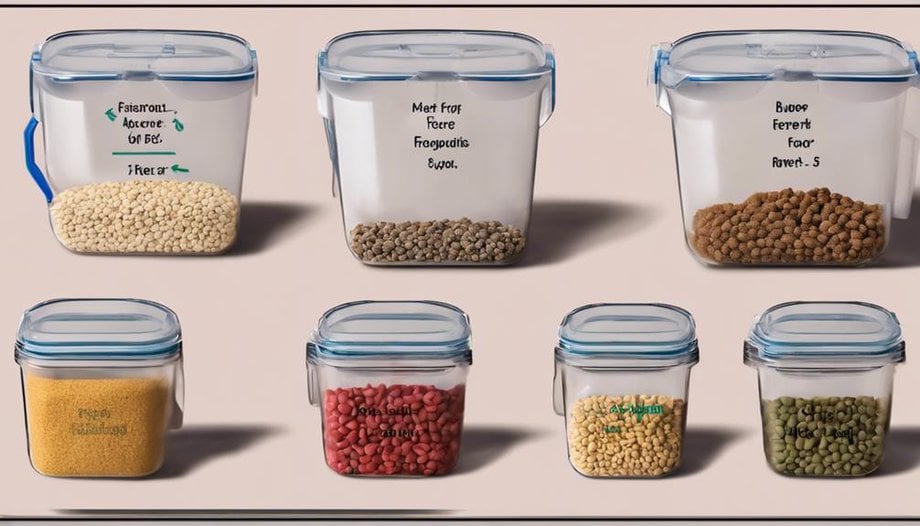
When it comes to selecting a container for your ferret's food, opt for an airtight, opaque container to keep out light and oxygen, which can degrade the food's nutritional value over time. Additionally, choose a container that is easy to clean and has a secure lid to prevent pests from getting into the food.
Store the food in a cool, dry place away from direct sunlight to maintain its freshness and prevent spoilage. Avoid storing the food near sources of heat or moisture, as these can also affect the food's quality. It's recommended to keep the food in its original packaging or to label the container with the expiration date to ensure you are using fresh food for your ferret.
Proper Storage Container
When storing ferret food, it's crucial to utilize airtight containers to maintain freshness and prevent contamination. Proper storage maintenance ensures that the food remains in optimal condition for your furry friends. Airtight containers help in moisture control, preventing the food from becoming soggy and unpalatable. Moisture can lead to mold growth and spoilage, making the food unsafe for consumption.
Moreover, airtight containers also aid in pest prevention by keeping insects and rodents away from the food. These critters aren't only a nuisance but can also introduce harmful bacteria to the food, posing a risk to your ferret's health. By sealing the food in airtight containers, you create a barrier that safeguards it from external contaminants.
In addition to pest prevention and moisture control, using airtight containers is essential for retaining the freshness of the ferret food. Fresh food isn't only more appealing to your pets but also ensures they receive the necessary nutrients from their diet. Proper storage practices contribute significantly to maintaining the quality and safety of the food you provide for your beloved ferrets.
Ideal Storage Location
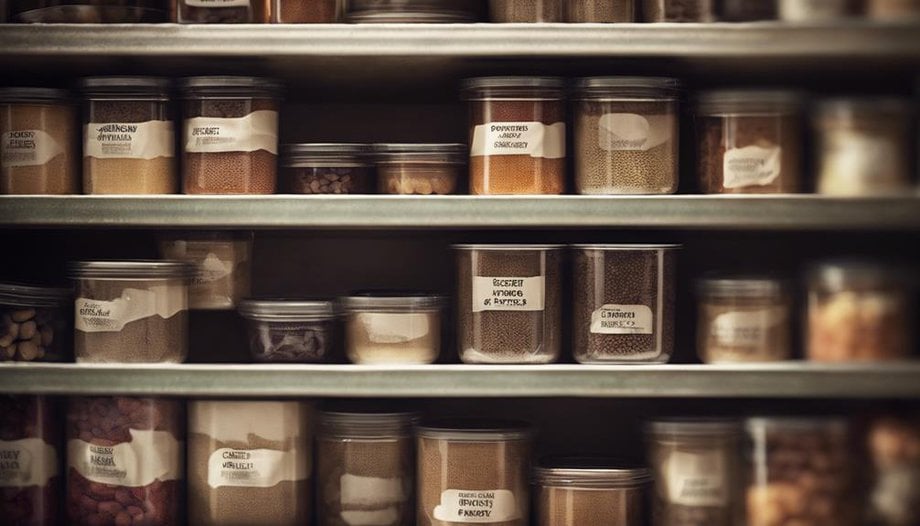
When considering the ideal storage location for ferret food, it's crucial to prioritize proper storage conditions to maintain freshness and prevent contamination.
Owners have various container options available to store their ferret's food, ranging from airtight bins to specialized pet food storage containers.
Choosing a location that's cool, dry, and away from direct sunlight will help ensure the longevity and quality of the food for the furry companions.
Proper Storage Conditions
For optimal preservation, store ferret food in a cool, dry place away from direct sunlight and moisture. Maintaining appropriate humidity levels is crucial to prevent the food from spoiling or becoming a breeding ground for mold.
Excess moisture can lead to bacterial growth and degradation of the food's nutritional value. Additionally, storing ferret food in a dry environment helps in pest prevention, as pests are attracted to damp areas.
Choosing a storage location that's cool and dry will ensure that the food remains fresh and free from contamination. By following these proper storage conditions, ferret owners can uphold the quality and safety of their pet's food, promoting their overall health and well-being.
Container Options
Consider storing ferret food in airtight containers to maintain freshness and prevent exposure to environmental factors that can compromise its quality.
Airtight containers, such as storage bins, are ideal for preserving the nutritional value of the food and keeping it safe from pests. Metal tins and plastic buckets also make excellent options for storing ferret food, as they help to shield it from moisture and air, which can lead to spoilage.
When choosing a container for ferret food storage, ensure that it's clean, dry, and securely sealed to prolong the shelf life of the food.
Temperature Control
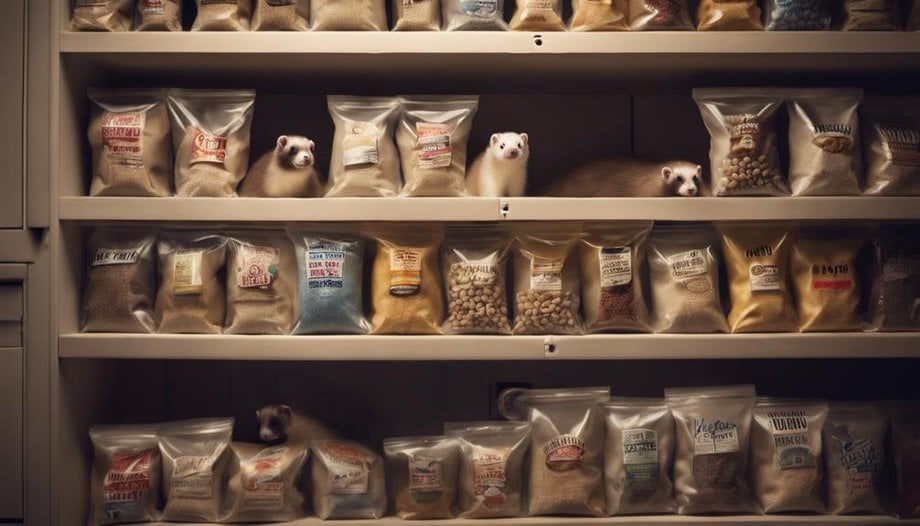
Maintaining the appropriate temperature is crucial for preserving the quality of ferret food. Here are three essential tips for temperature control when storing ferret food:
- Humidity Control: It's important to store ferret food in a cool, dry place to prevent moisture buildup. High humidity levels can lead to the growth of mold and bacteria in the food, compromising its quality and safety. Consider using airtight containers or bags with desiccants to absorb excess moisture and keep the food fresh for longer.
- Pest Prevention: Store ferret food in a location where pests like insects or rodents can't access it. These pests can't only contaminate the food but also cause spoilage. Keeping the food in sealed containers or elevated shelves can help prevent unwanted visitors from reaching it.
- Spoilage Prevention: Avoid storing ferret food in areas exposed to extreme temperatures, such as near heaters or in direct sunlight. High temperatures can accelerate the degradation of nutrients in the food and lead to spoilage. Optimal storage conditions will help maintain the food's freshness and nutritional value for your ferret.
Avoid Direct Sunlight
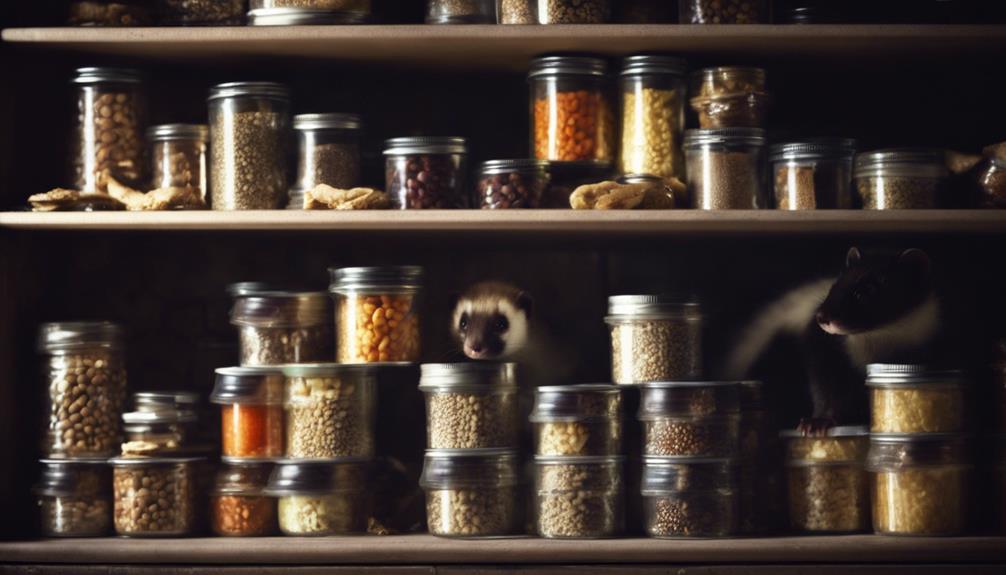
Storing ferret food away from direct sunlight is crucial to maintain its quality and prevent nutrient degradation. Direct sunlight exposure can lead to a faster breakdown of essential nutrients in the food, reducing its overall nutritional value for the ferrets. To prevent this, it's recommended to place the food containers in a cool, dark area away from windows or any direct sunlight sources.
When considering storage options, using a designated storage shelf for the ferret food can help keep it organized and easily accessible while ensuring it's kept out of direct sunlight. This shelf should be placed in a cool and dry location to further preserve the food's quality.
Additionally, implementing a food rotation system is essential to ensure that the oldest food is used first. By rotating the food stock regularly, you can prevent any food from sitting for too long and potentially expiring or losing its nutritional value. This practice also helps maintain freshness and quality in the ferret's diet.
Air-tight Sealing
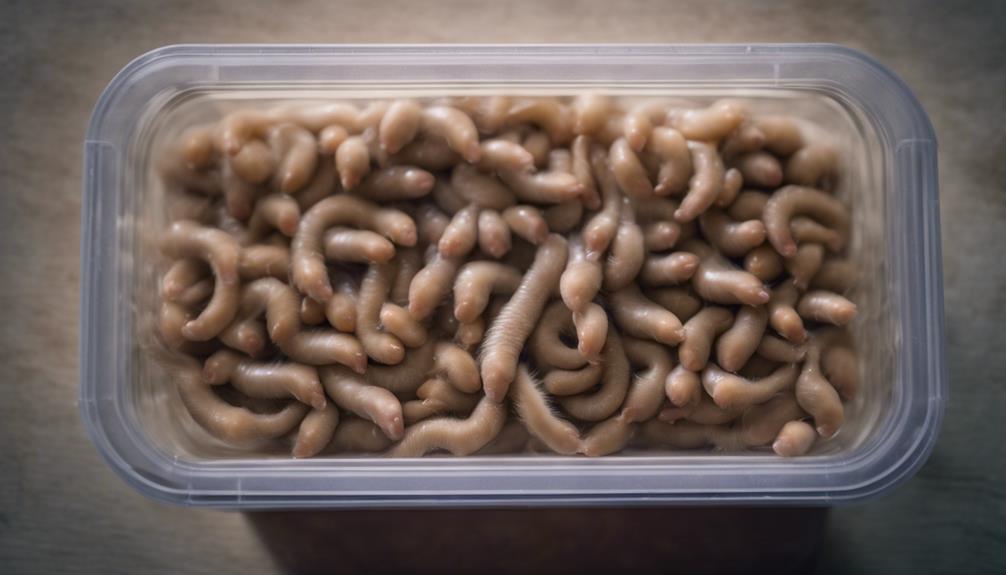
To ensure optimal preservation of ferret food quality and freshness, sealing the containers air-tight is a critical step in maintaining its nutritional integrity.
- Vacuum Sealing: Utilizing a vacuum sealer is an excellent method to remove air from the container, preventing oxidation and maintaining the food's freshness for a longer period.
- Airtight Containers: Investing in high-quality airtight containers ensures that no air can enter, keeping the ferret food safe from moisture, pests, and staleness.
- Regular Inspection: It's essential to periodically check the seals of the containers to ensure they're intact and functioning correctly. This practice helps in identifying any potential issues that may compromise the freshness maintenance of the ferret food.
Regular Cleaning Routine

Implementing a regular cleaning routine is crucial for ensuring the hygiene and safety of stored ferret food. Routine maintenance not only helps prevent contamination but also extends the shelf life of the food, keeping it fresh and nutritious for your ferrets. Maintaining high hygiene practices in cleaning the storage containers, scoops, and feeding bowls is essential to avoid the growth of mold, bacteria, or pests that could harm your pets.
| Cleaning Item | Frequency |
|---|---|
| Storage containers | Weekly |
| Scoops | Daily |
| Feeding bowls | Daily |
Rotating Food Supply
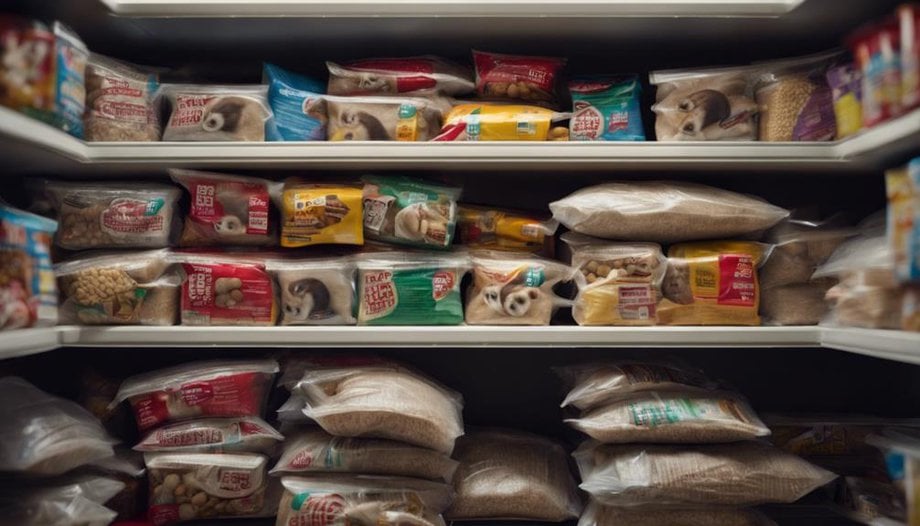
Maintaining a rotation schedule for your ferret's food supply is essential for ensuring freshness and nutritional quality over time. By following proper food rotation strategies and being mindful of expiration dates, you can provide your furry friend with a diet that's both balanced and varied.
Here are three key points to consider when rotating your ferret's food supply:
- Check Expiration Dates: Always check the expiration dates on your ferret's food packaging. By using the oldest food first and rotating in newer purchases, you can ensure that your ferret is always eating fresh and safe food.
- Nutritional Balance: Rotate between different types of ferret food to provide a well-rounded diet. This helps ensure that your ferret receives all the necessary nutrients for optimal health and vitality.
- Dietary Variety: Introduce variety into your ferret's diet by rotating between different protein sources and flavors. This not only keeps mealtime interesting for your pet but also helps prevent dietary boredom and potential food sensitivities.
Frequently Asked Questions
Can You Store Ferret Food in the Refrigerator or Freezer for Long-Term Storage?
Storing ferret food in the refrigerator or freezer for long-term storage is beneficial. Freezing maintains freshness longer. However, fridge storage is suitable for short-term needs. It's essential to seal food properly to maintain quality and prevent contamination.
Are There Any Specific Guidelines for Storing Homemade or Raw Food Diets for Ferrets?
When storing homemade or raw ferret diets, safety is paramount. To ensure freshness and prevent bacterial growth, refrigerate perishable portions promptly. Use airtight containers, label with dates, and adhere to recommended storage times to maintain optimal nutrition for the ferrets.
How Often Should I Clean the Storage Container for Ferret Food?
When it comes to cleaning the storage container for ferret food, it's essential to do so regularly to maintain freshness and prevent contamination. Cleaning frequency should align with the shelf life of the ferret diet.
Is It Safe to Store Ferret Food in a Garage or Outdoor Shed?
Storing ferret food in outdoor storage like a garage or shed poses risks due to temperature fluctuations. Extreme heat or cold can spoil the food quickly. It's best to store it in a cool, dry place indoors.
Can I Use a Regular Plastic Container to Store Ferret Food, or Do I Need a Specialized Container?
For proper ventilation and pest prevention, it is recommended to use a specialized container for storing ferret food. Regular plastic containers may not provide the necessary protection against pests and maintain the freshness of the food.











